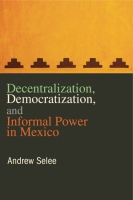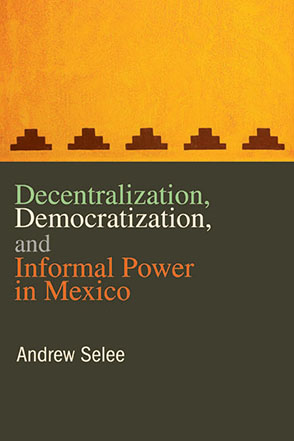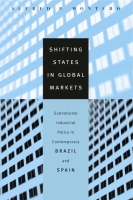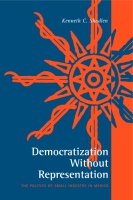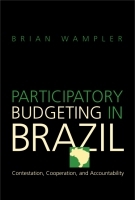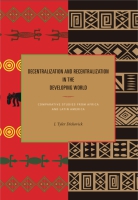Decentralization, Democratization, and Informal Power in Mexico
Andrew Selee
“Decentralization, Democratization, and Informal Power in Mexico is a fascinating, beautifully crafted, and revealing account of just how much Mexican democratization has taken place at the local level. Andrew Selee has used extensive field research and years spent living in Mexico to examine the extent to which electoral democracy has taken hold as the primary means of communicating citizen demands in three distinct municipalities. He discovers that many of the informal processes that characterized decision-making at the local level before the democratic transition continue to the present, clearly demonstrating the limits of institutional change on citizen participation. Equally important, Selee demonstrates how informal power is significantly shaping democratic outcomes.”
- Description
- Reviews
- Bio
- Table of Contents
- Sample Chapters
- Subjects
“Decentralization, Democratization, and Informal Power in Mexico is a fascinating, beautifully crafted, and revealing account of just how much Mexican democratization has taken place at the local level. Andrew Selee has used extensive field research and years spent living in Mexico to examine the extent to which electoral democracy has taken hold as the primary means of communicating citizen demands in three distinct municipalities. He discovers that many of the informal processes that characterized decision-making at the local level before the democratic transition continue to the present, clearly demonstrating the limits of institutional change on citizen participation. Equally important, Selee demonstrates how informal power is significantly shaping democratic outcomes.”
“Andrew Selee has written a compelling, insightful book on decentralization and democracy in Mexico. Based on research that began in 1992, Selee illuminates the changes as well as the continuities in the politics of three Mexican municipalities. Although it mattered that each of the municipalities was governed by a different political party, past networks of informal power endured and mattered as well. Selee’s original, nuanced analysis is an extremely valuable contribution to scholarly understanding of democratic institutions.”
“Andrew Selee’s book is a remarkable contribution to our understanding of democratic transition and decentralization in Mexico—two of the most prominent processes shaping the Mexican state and society at the onset of the twenty-first century. Selee’s detailed case studies offer a well-organized and representative portrayal of local contexts in Mexico and provide rich insights into municipal governments. Demonstrating intellectual rigor and deep analysis, this excellent book is a must-read for scholars and policy makers interested in recent political developments in Mexico.”
“Through careful analysis, Selee shows that decentralization in Mexico has been shaped by the traditional relationships between central and local political actors. He is convincing that more democratic governments and more effective local governments are constructed over time and are deeply affected by the contexts in which they develop. Decentralization, Democratization, and Informal Power in Mexico is a well-researched, informative, and welcome addition to the literature on decentralization and democratization.”
Andrew Selee is Director of the Mexico Institute at the Woodrow Wilson International Center for Scholars in Washington, DC.
Contents
List of Figures
Acknowledgments
1. Introduction: The Paradoxes of Local Empowerment
Part 1 State Formation and Political Change
2. Centralization and Informal Power
3. Decentralization and Democratization
Part 2 A Tale of Three Cities
4. Chilpancingo: The Continuation of Corporatism?
5. Tijuana: Liberal Democracy?
6. Ciudad Nezahualcóyotl: Social Movement Democracy?
Part 3 Conclusions
7. Pathways of Democratic Change
Index
Introduction
The Paradoxes of Local Empowerment
In the 1980s and 1990s, decentralization reforms swept across Latin America and the developing world, as almost every country implemented measures to strengthen the authority and autonomy of local governments. Mexico was no exception. At least in formal terms, Mexico had been one of the most centralized countries in Latin America. From the 1930s to the early 1980s, a single party dominated almost all aspects of political life, including holding most elected positions. Between 80 and 90 percent of all public resources in the early 1980s were spent through national government agencies despite the nominal existence of a federal system. By the new millennium, however, Mexico had become a multiparty democracy and almost half of all public resources were managed at the state and local level. State and local governments, which had appeared to be mere appendages of an overwhelmingly dominant central state, now had a degree of discretion in spending and policy making they had not enjoyed in decades. Even more important, this process of decentralization took place in the context of a gradual process of democratization in which the country instituted truly competitive elections for the first time in decades.
Proponents have argued that decentralization has the potential to improve democratic governance by making elected authorities more responsive because they would be closer to citizens and better able to discern their preferences. In addition, decentralization would bring citizens closer to government, allowing them to know what their elected officials were doing and to interact with them more frequently. Decentralization would thus reinforce democracy by making government more accountable and ensuring enhanced opportunities for citizen participation in political life. In short, democracy “close to home” would allow citizens a quality of politics that could not be achieved with democracy on a larger scale.
However, much of what we know about the relationship between decentralization and democracy is from the experience of the developed world. In most of those countries, the construction of democratic institutions and the extension of citizenship rights took place during a period of centralization, and decentralization has occurred after these rights and institutions were largely determined.1 Citizenship rights, of course, are still being negotiated, extended, and restricted in these countries, and political institutions are frequently modified, sometimes to respond to major failings in the institutional structure.2 However, the greatest expansion of citizenship rights in what are today considered developed countries generally coincided with periods of centralization. Indeed, the struggle for inclusive rights has often led to greater central government intervention to ensure equal access to rights in areas where they are least enforced.
In contrast, in Mexico, as in much of the developing world, decentralization has coincided with a period of democratic transition.3 Local governments are being empowered at the same time that political institutions at all levels of government are being constructed and citizenship rights negotiated and expanded. We understand too little about how decentralization affects democratic governance in contexts where political institutions are still under construction and citizenship rights are often weakly defined and enforced. Does decentralization in the context of democratization empower local governments that are responsive and accountable to citizens? Or does the weak enforcement of rights and incipient institutional structures of democracy undermine the few channels that exist to ensure government responsiveness and accountability? In other words, does decentralization reinforce democratization or does it limit its potential?
It is not easy to arrive at the answer to these questions, but the available evidence from the effect of the most recent round of decentralization on democratic governance in the developing world is decidedly mixed. There are numerous documented examples of more responsive and accountable governments throughout the world. However, the literature is also replete with cautionary tales about how empowering local governments can weaken the state and undermine citizenship rights. In other cases, local governance simply appears to be weak and ineffectual, given local authorities’ inability to resolve daily problems as effectively as the central state can.
Although scholars recognize these uneven outcomes, there is no consensus about the reasons for the discrepancies. Traditional explanations have tended to focus on formal political institutions or long-term characteristics of the social structure. Scholars and experts have argued for the need to design adequate institutions to improve coordination among levels of governments. Others have emphasized the need to strengthen local government institutions. Still other scholars have signaled that long-term social characteristics shape outcomes. However, Decentralization, Democratization, and Informal Power in Mexico suggests that we need to look beyond formal political institutions or inherent structural qualities to examine the way that informal power relations are constructed between the state and citizens and how these interact with formal political changes during the process of decentralization and democratization.
In the traditional interpretation within the literature, authoritarian states in the developing world were highly centralized, and democratization brought about a process of decentralization.4 However, as we will see, the Mexican state was never as centralized as the literature generally suggests. As in much of the region, the underlying logic of politics in Mexico was a bit more complex. For its survival during several decades of one-party hegemonic rule, it relied on extensive alliances with power centers outside the state, even while its formal institutions were highly centralized.5 What looked to most observers like a monolithic, centralized authoritarian state was actually a state that was much more diffuse and based on a series of informal power arrangements with key veto players in the political system, especially local and regional party leaders who often had their own bases of power. Formal political institutions existed alongside clientelism, particularism, and shared understandings about how decisions could be made at the margins of legal arrangements. Formal power was highly centralized within the state, whereas informal power, which sustained the state’s legitimacy and effectiveness, was deeply decentralized. It is a central contention of this book that informal power can be as influential as formal institutions.
On the face of it, this analysis would suggest that decentralizing formal power in the context of weak citizenship rights would simply reinforce channels of informal power and thus strengthen local and regional leaders in the authoritarian system at the expense of government accountability and responsiveness. This might be even more likely since decentralization coincided with a period of economic liberalization or marketization that helped undermine the social safety nets that had sustained families and communities.6 The rise in poverty during this period is likely to have strengthened informal power at the expense of formal relationships.
However, decentralization and democratization have been largely simultaneous processes in Mexico, as is the case in much of Latin America. Democratization has created new ways of choosing leaders and renewed channels of intermediation between citizens and the state. In the process of democratization, citizens have also mobilized to demand accountability from public authorities and developed new repertoires for engagement with them. Although the underlying logic of Mexico’s authoritarian system was a dense web of informal power relationships, democratization has provided an impulse for the construction of new formal channels for intermediation with the state. Economic liberalization provided an additional impetus to citizens’ efforts to mobilize for democratic change and the strengthening of formal institutions.
Decentralization, Democratization, and Informal Power in Mexico examines how democratic governance has changed in three Mexican cities—Tijuana, Ciudad Nezahualcóyotl, and Chilpancingo. For several consecutive administrations during the period of most intense decentralization and democratization, each city was governed by a different political party: Tijuana by the Partido Acción Nacional (PAN), Ciudad Nezahualcóyotl by the Partido de la Revolución Democrática (PRD), and Chilpancingo by the Partido Revolucionario Institucional (PRI). The formal institutions that shaped decentralization and democratization in these municipalities are quite similar, which lets us examine how informal institutions may have shaped the responsiveness and accountability of local governments. In particular, this book looks at the way that the real channels for intermediation between citizens and their local governments have changed as municipalities have acquired new functions, powers, and resources, and as elections have become more competitive in these three cities. The research looks at the way different political parties are embedded in society, the density of social organizations and their horizontal and vertical linkages, and the structure of clientelism and corporatism as possible intermediate variables that might influence divergent outcomes for decentralization in the context of democratization and shape the way that formal institutional changes take effect.
The research in this book finds important variations in these patterns across cities, which produce significantly different outcomes for democratic governance in the context of decentralization and democratization. It also finds some constants in how informal power is constituted in Mexico that condition this process more generally across municipalities. The past is often prologue: the way the Mexican state was formed through networks of informal power conditions the way formal institutional changes take place today. Yet, at the same time, I find that different pathways of change in each place shape the way formal institutions work from city to city.
Mailing List
Subscribe to our mailing list and be notified about new titles, journals and catalogs.
